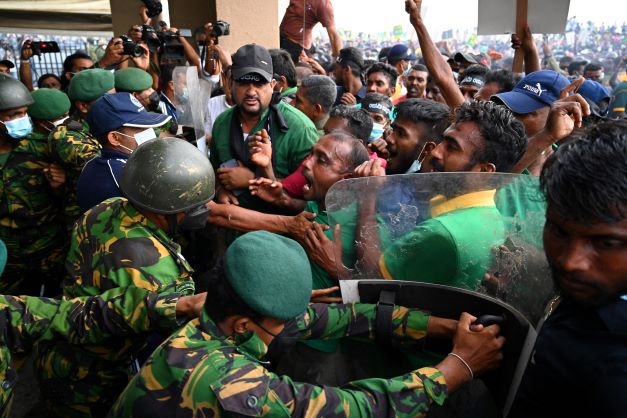Angry crowd tries to storm Sri Lanka president’s office
COLOMBO – A huge crowd tried to storm the Sri Lankan president’s seaside office Tuesday (15) as anger flared over runaway prices brought about by the worst financial crisis in the island’s modern history.
The cost of food, medicine and other essential goods have risen dramatically across the South Asian nation, with long queues outside petrol stations and rolling blackouts now the norm.
A critical foreign currency shortage has left traders unable to pay for imports, and President Gotabaya Rajapaksa met with a visiting International Monetary Fund (IMF) delegation to discuss solutions to the worsening economic situation.
Shortly after the meeting, several busy streets in Colombo were blocked by protesters, who poured into the centre of the capital despite weeks of severe disruptions to public transport caused by fuel shortages.
A crowd marshalled by the main opposition party, the Samagi Jana Balawegaya (SJB), surrounded the Presidential Secretariat and clashed with heavily armed police, who pushed back efforts to barge into the building.
“These people have come here to tell the president to go home if he can’t solve the unprecedented economic problems faced by ordinary people,” said SJB lawmaker Harin Fernando, as the crowd chanted calls for Rajapaksa’s resignation.
The coronavirus pandemic wrought havoc on Sri Lanka’s economy and crippled earnings from the island’s tourism sector – a key foreign exchange earner.
International rating agencies have downgraded Sri Lanka, effectively blocking its access to commercial borrowings, and raised doubts about the government’s ability to service its $51 billion external debt.
Fuel costs have risen by nearly 80% since early February while food prices rose by a quarter according to January figures.
Sri Lanka last week allowed the rupee to float, a move that saw the currency nosedive 25% against the dollar and triggered a fresh wave of price increases.
It followed calls by the IMF for a currency devaluation and higher taxes to revive the economy.
In a brief statement on Monday (14), the IMF said it had not been asked for a bailout, but was “ready to discuss options if requested”.
– Agence France-Presse


